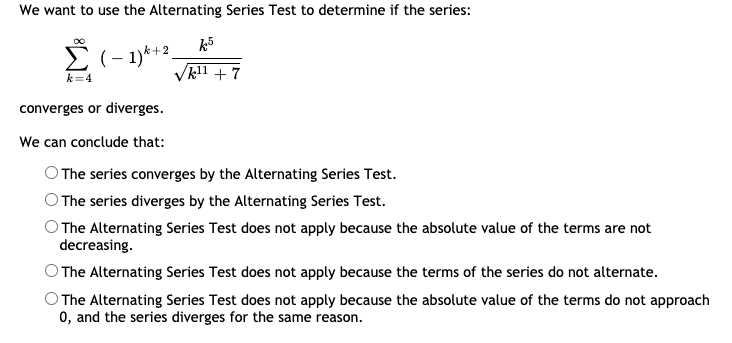We want to use the Alternating Series Test to determine if the series: (– 1)*+2__ k5 VRl1 + 7 k=4 converges or diverges. We can conclude that: O The series converges by the Alternating Series Test. O The series diverges by the Alternating Series Test. O The Alternating Series Test does not apply because the absolute value of the terms are not decreasing. O The Alternating Series Test does not apply because the terms of the series do not alternate. O The Alternating Series Test does not apply because the absolute value of the terms do not approach 0, and the series diverges for the same reason.
We want to use the Alternating Series Test to determine if the series: (– 1)*+2__ k5 VRl1 + 7 k=4 converges or diverges. We can conclude that: O The series converges by the Alternating Series Test. O The series diverges by the Alternating Series Test. O The Alternating Series Test does not apply because the absolute value of the terms are not decreasing. O The Alternating Series Test does not apply because the terms of the series do not alternate. O The Alternating Series Test does not apply because the absolute value of the terms do not approach 0, and the series diverges for the same reason.
Calculus: Early Transcendentals
8th Edition
ISBN:9781285741550
Author:James Stewart
Publisher:James Stewart
Chapter1: Functions And Models
Section: Chapter Questions
Problem 1RCC: (a) What is a function? What are its domain and range? (b) What is the graph of a function? (c) How...
Related questions
Question

Transcribed Image Text:We want to use the Alternating Series Test to determine if the series:
k5
(– 1)*+2.
k=4
/kl1 + 7
converges or diverges.
We can conclude that:
O The series converges by the Alternating Series Test.
The series diverges by the Alternating Series Test.
O The Alternating Series Test does not apply because the absolute value of the terms are not
decreasing.
O The Alternating Series Test does not apply because the terms of the series do not alternate.
O The Alternating Series Test does not apply because the absolute value of the terms do not approach
0, and the series diverges for the same reason.
Expert Solution
This question has been solved!
Explore an expertly crafted, step-by-step solution for a thorough understanding of key concepts.
This is a popular solution!
Trending now
This is a popular solution!
Step by step
Solved in 2 steps

Knowledge Booster
Learn more about
Need a deep-dive on the concept behind this application? Look no further. Learn more about this topic, calculus and related others by exploring similar questions and additional content below.Recommended textbooks for you

Calculus: Early Transcendentals
Calculus
ISBN:
9781285741550
Author:
James Stewart
Publisher:
Cengage Learning

Thomas' Calculus (14th Edition)
Calculus
ISBN:
9780134438986
Author:
Joel R. Hass, Christopher E. Heil, Maurice D. Weir
Publisher:
PEARSON

Calculus: Early Transcendentals (3rd Edition)
Calculus
ISBN:
9780134763644
Author:
William L. Briggs, Lyle Cochran, Bernard Gillett, Eric Schulz
Publisher:
PEARSON

Calculus: Early Transcendentals
Calculus
ISBN:
9781285741550
Author:
James Stewart
Publisher:
Cengage Learning

Thomas' Calculus (14th Edition)
Calculus
ISBN:
9780134438986
Author:
Joel R. Hass, Christopher E. Heil, Maurice D. Weir
Publisher:
PEARSON

Calculus: Early Transcendentals (3rd Edition)
Calculus
ISBN:
9780134763644
Author:
William L. Briggs, Lyle Cochran, Bernard Gillett, Eric Schulz
Publisher:
PEARSON

Calculus: Early Transcendentals
Calculus
ISBN:
9781319050740
Author:
Jon Rogawski, Colin Adams, Robert Franzosa
Publisher:
W. H. Freeman


Calculus: Early Transcendental Functions
Calculus
ISBN:
9781337552516
Author:
Ron Larson, Bruce H. Edwards
Publisher:
Cengage Learning